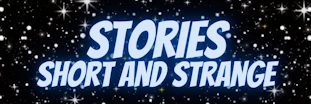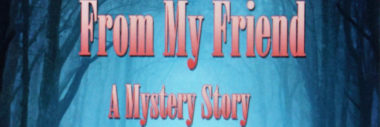Stories Short and Strange
17 short stories for general audiences ranging from the unusual to the unbelievable to the just plain strange.


17 short stories for general audiences ranging from the unusual to the unbelievable to the just plain strange.

Jim Jenkins is an ace detective who solves the most difficult crimes. Yet he always works alone. Or does he?

“He followed me home, Mom, can I keep him?” Why do we each seem to know what the other is thinking? ... Anyone wishing for an adult PAW Patrol will love this!
Actually, a palindrome can be just about anything that is the same both forwards and backwards. (See http://en.wikipedia.org/wiki/Palindrome) The Greeks and Romans had a type of palindrome in which the words rather than letters are read in reverse order. “Jack loves Jill, not Jane” versus “Jane, not Jill, loves Jack”. This is harder in English, so
Mine is (of course) the common form of my first name: Bob. (Sometimes when authors autograph books for me, I tell them “Try not to get it backwards.”) The most elaborate palindrome I’ve ever seen is “Go hang a salami! I’m a lasagna hog!” This was by a clever writer named Jon Agee, who’s written
A comment on the English language: The English language is about one half redundant. Do you agree? If not, just read the words in bold. (I saw this on a sign in Hollywood, CA.)
Something about the menu didn’t seem quite right. We were at one of our favorite restaurants for our weekly Saturday dining-out. The menu had been redone, and one of the new offerings caught my eye. It was an appetizer: Chicken Fingers with dipping sauce $3.99 Maybe it was the fact that I was unusually alert
There’s snow all over the place in Dayton, OH, so today I thought I’d share one of my poems. (BTW, it’s in the Some Poems About Life book.) Perspective The son stood in the doorway, Behold a beautiful sight! As far as he could see, nothing but fluffy white! Today would be a time of laughter
Yesterday’s column piqued a friend’s curiosity. In an email he asked what Thai words that I remember have made it into English? My tour of duty in Southeast Asia was 1972-73, but I quickly remembered one word — nitnoy. It’s online in the Urban Dictionary. Nitnoy — “A little bit” – from Thai “Nit Noi”.
If the English language is so idiomatic (as discussed yesterday), why does it enjoy worldwide popularity? Language-wise, the book The Story of English gives three reasons: — Unlike all the other European languages, gender is determined by meaning, so a noun doesn’t have to be matched with the right article. For example, in French the moon
Beware of heard, a dreadful word That looks like beard and sounds like bird, And dead: it’s said like bed, not bead — For goodness’ sake, don’t call it deed! Presumably written by a frustrated immigrant trying to learn the language, this poem exemplifies the inconsistencies in English. As related in The Story of English
I once worked with a young lady who was in her first job. She told me the story of how she had gotten hired at 18, and all the living space she could afford was an efficiency apartment. At that time, she was very close to her little brother, who was about ten years younger.
“An optimist stays up to see the New Year in. A pessimist waits to make sure the old one leaves.” — Bill Vaughn “Cheers to a new year and another chance to get it right.” — Oprah Winfrey http://www.quotationspage.com/